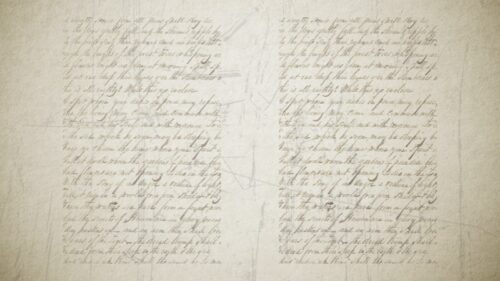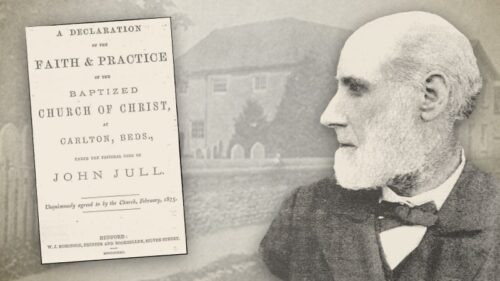-
Article 2 – The Blessed Trinity In Unity
Articles Of The Faith And Order Of A Primitive Or Strict And Particular Baptist Church Of The Lord Jesus Christ, Based On The Declaration Of Faith And Practice Of John Gill, D. D., 1720 II. The Blessed Trinity in Unity. We believe that there is one living and true God,[1] the Creator and Upholder of all things,[2] and that there are three eternal Persons in the Godhead, the Father, the Son, and the Holy Ghost, who are equal in nature, power and glory,[3] and that the Son and the Holy Ghost are as truly and properly God as the Father.[4] ------------------------------- [1] Deut 6:4; 5:26; Jn 18:3; 1 Thess 1:9; 1 Tim 2:5; Js 2:19 [2] Gen 1:1; Ex 20:11; Job 7:20; Jn 1:3; Acts…
-
Book 2: Chapter 1, Through The Fall And Revolt Of Adam, The Whole Human Race Made Accursed And Degraded Of Original Sin
I. How necessary the knowledge of ourselves is, its nature, the danger of mistake, its leading parts, sect. 1, 2, 3. II. The causes of Adam’s fearful fall, sect. 4. III. The effects of the fall extending to Adam’s posterity, and all the creatures, sect. 5, to the end of the Chapter, where the nature, propagation, and effect of original sin are considered. Sections. 1. The knowledge of ourselves most necessary. To use it properly we must be divested of pride, and clothed with true humility, which will dispose us to consider our fall, and embrace the mercy of God in Christ. 2. Though there is plausibility in the sentiment which stimulates us to self-admiration, the only sound sentiment is that which inclines us to…
-
Article 1 – The Holy Scriptures
Articles Of The Faith And Order Of A Primitive Or Strict And Particular Baptist Church Of The Lord Jesus Christ, Based On The Declaration Of Faith And Practice Of John Gill, D. D., 1720 I. The Holy Scriptures. We believe that the Holy Scriptures of the Old and New Testaments are verbally inspired,[1] and our sole, supreme, and all-sufficient guide in every matter of Christian Faith and Practice.[2] ------------------------------- [1] Jn 10:35; 2 Tim 3:16; 2 Pet 1:20,21 [2] Psalm 19:9 -11; 119:128; Is 8:20; Lk 16:29-31; Jn 5:39; 2 Tim 3:15,16; 2 Pet 1:20,21 -------------------------------------------------------------- Annotations: Inspiration Asserted Note 1.—The passages cited clearly assert that, while the books of the Bible were written by human authors, (whose personal peculiarities are often apparent in their…
-
The Articles Of Faith Of A Strict And Particular Baptist Church
Articles Of The Faith And Order Of A Primitive Or Strict And Particular Baptist Church Of The Lord Jesus Christ, Based On The Declaration Of Faith And Practice Of John Gill, D. D., 1720 Anne Askew, Martyred 1846“I am not she that list My anchor to let fall, For every fleeting mist, My hope’s substantial."Gorge Murrell, St. Neots“I may lose all my friends. Well, be it so, if it is God’s will; but I am determined to go to hevane alone, rather than walk in fellowship with any who repudiate His truth, and decline to obey His commandments.”------------------------------- Introduction: Having been enabled, through Divine grace, to give ourselves to the Lord, and likewise to one another, according to the will of God[1], we count it…
-
27 Bible Doctrine – How Can The Framework Of Sovereign Grace Be Used As A Tool For Discipleship And Evangelism?
A Transcript Of The Video Study In our previous study, I commended the Framework of Sovereign Grace as an excellent teaching tool for evangelism and discipleship. First, it is a scripturally shaped framework, based on the teachings of Romans 9:21-23 and 2 Timothy 2:20; Second, it begins with the Unconditional Election of God the Father, rather than the Total Depravity of man; Third, it allows room to discuss other vital doctrines and related issues within the context of God’s masterplan for the ages; Fourth, it doesn’t require the use of unnecessary academic labels; Fifth, it presents the major teachings of the Bible in the form of a diagram, illustrating how they fit together as a whole; Sixth, it tends to nurture a warm and humble…
-
26 Bible Doctrine – Are There Disadvantages Using The Five Points Of Calvinism As A Tool For Evangelism And Discipleship?
A Transcript Of The Video Study In our previous study, I gave an explanation on what I believe the terms evangelism and discipleship mean, and then proceeded to show how the Five Points of Calvinism can be used as a teaching tool for both. In my concluding remarks, I commended to you the use of the Five Points for that purpose. Indeed, there are some advantages associated with using the Five Points as a teaching tool—first, it provides a basic summary of the duties incumbent upon the unregenerate under the authority of the covenant of works, and also of the blessings bestowed upon the regenerate under the authority of the covenant of grace; second, it clearly distinguishes between the free will of man on the…








